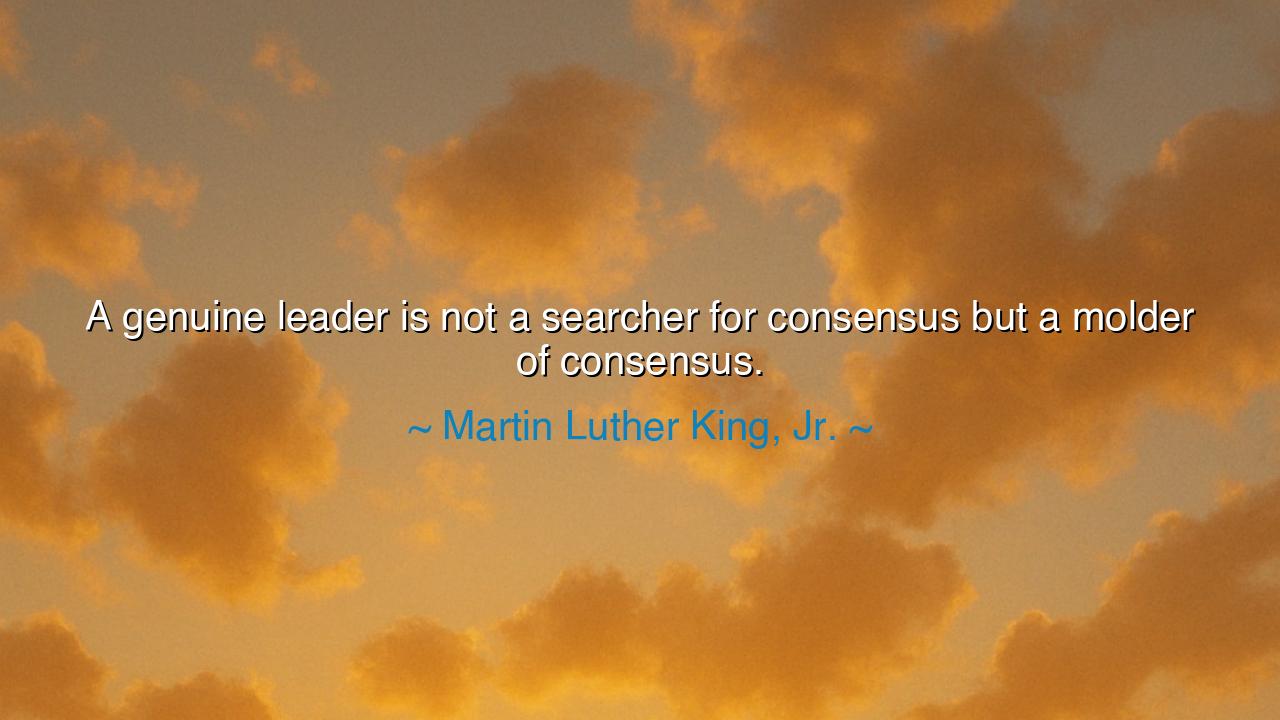
A genuine leader is not a searcher for consensus but a molder of






“A genuine leader is not a searcher for consensus but a molder of consensus.” Thus proclaimed Martin Luther King, Jr., the prophetic voice of justice whose words still thunder across the ages. In this saying lies the essence of true leadership—that it is not the art of pleasing the crowd, but of shaping its purpose; not the act of waiting for agreement, but the labor of guiding hearts toward it. For a genuine leader does not drift with the tides of public opinion—he commands the winds, steering the vessel of his people toward the horizon of truth.
To search for consensus is to look outward—to listen for the clamor of voices and measure one’s path by their approval. Such a leader is like a reed that bends with every breeze, fragile and uncertain, guided not by conviction but by convenience. But the molder of consensus stands rooted in vision. He begins not with agreement, but with faith; not with popular will, but with principle. He sees not what the people are, but what they could become if called to their higher selves. His task is not to follow comfort, but to awaken courage, to forge unity where division reigns.
Martin Luther King, Jr., born in an age of turmoil, knew this truth through fire and trial. During the Civil Rights Movement, he faced not only the hatred of his enemies but also the hesitation of his allies. Many counseled patience, others compromise. They urged him to wait, to find a middle ground that would offend none and please all. But Dr. King refused to be a searcher for consensus. He was not content to walk behind public opinion—he sought to mold it. Through his words, his marches, his imprisonment, and his unyielding faith, he stirred the conscience of a nation. He transformed apathy into urgency, fear into courage, and scattered voices into a mighty chorus that sang for freedom.
Such is the burden of true leadership—it demands vision when others see only chaos. The genuine leader must often walk alone, misunderstood and maligned, for the path of transformation begins in solitude. Yet in time, his conviction becomes contagious; his courage becomes the seed of unity. Dr. King’s dream was not born from agreement—it created agreement. He did not wait for the world to be ready; he made it ready through the power of his words and the strength of his example.
Throughout history, the same pattern shines. Winston Churchill, standing against the rising tide of tyranny, refused to yield when his nation sought peace through surrender. Mahatma Gandhi, facing the vast empire of Britain, did not seek permission to free his people—he led them through his steadfast belief in nonviolence. In every age, the true leader shapes the moral landscape; he does not mirror it. The molder of consensus works not to echo the desires of the people, but to lift them to a vision higher than they yet dare to see.
To be such a leader requires not arrogance, but courage—the courage to stand firm when others waver, to speak truth when silence would be safer. The searcher for consensus seeks comfort; the molder of consensus seeks change. The former is beloved in the moment; the latter is honored through eternity. For when the fire of conviction burns brightly, it warms even those who once feared its flame. And though the molder may suffer in his own time, his work endures in the lives of generations transformed by his faith.
Therefore, O seeker of wisdom, learn from the example of Dr. King and all who walked this path before him. Do not seek to lead by applause, for the applause of the crowd is fleeting. Instead, lead by principle—by vision so clear that it cuts through doubt, and by truth so strong that it binds people together in purpose. Be the forger of unity, not its servant. Speak not only to ears, but to hearts; act not only for peace, but for justice. And when opposition rises—as it surely will—stand firm, knowing that conviction, not consensus, is the forge of all true progress.
The lesson is clear: The world does not advance by those who wait for agreement, but by those who create it. A genuine leader does not follow the crowd—he transforms it. He molds chaos into harmony, fear into faith, hesitation into action. So, take courage. Speak your truth with wisdom and love, and shape the consensus that tomorrow will remember. For in the end, as Martin Luther King, Jr. taught us, leadership is not the pursuit of approval—it is the art of awakening the soul of humanity.






AAdministratorAdministrator
Welcome, honored guests. Please leave a comment, we will respond soon